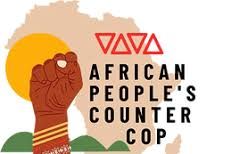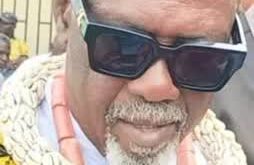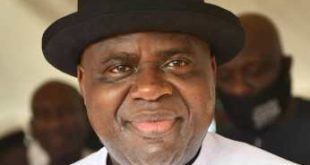… Laments ‘Systematic Oppression, Climate Injustice’ by Global North
The African People’s Counter COP (APCC), and the Africa Climate Justice Coalition (ACJC) have called for climate justice, reparations, remediation and compensation to the impacted peoples of Africa, food and energy sovereignty and democracy, as well as end to fossil fuel extractions across Africa.
In a statement endorsed by seven Pan-African groups, tagged, ‘Africa United Against Systematic Oppression and Climate Injustice: African People’s Climate Justice Declaration October 2024,’ APCC stressed that the Global North nations, “who have contributed the most to the climate crisis, must lead the process of cutting emissions at source, and fund the needed transitions as payment for the climate debt owed to the Global South.”
The groups that signed the statement include, Health of Mother Earth Foundation (HoMEF), Green Development Advocates (GDA), Community Development Advocacy Foundation-CODAF, Appui pour le Mieux-être et l’Autonomisation d’un Monde Rural Responsable et Engagé (AMARRE-Bénin), Congo Basin Conservation Society CBCS network DRC, Kebetkache Women Development & Resource Centre and Women Initiative on Climate Change (WICC).
Our reporter gathered that after three years of virtual convening, the African Climate Justice Collective (ACJC) held the first physical African People’s Counter COP (APCC) in Saly, Senegal, from 7 to 10 October 2024, with the theme; Africa United Against Systematic Oppression and Climate Injustice.
The APCC was joined by over one hundred participants from social movements, grassroots communities, women, youth, civil society organisations, academics, workers, and others from 21 countries.
According to the statement released at the end of the event, the group said that “the APCC recognises that African voices have largely been excluded from the United Nations Framework Convention on Climate Change Conference of Parties (UNFCCC COP), which has been captured by Global North states and corporations that continue to fuel the climate crises while falsely claiming to solve the causes of climate change.
“The APCC is therefore a movement to denounce the COP system, highlight the impacts of climate change on African communities and showcasing viable alternative solutions. This is done through knowledge sharing and activism from the most vulnerable African communities at the frontline of the climate crisis especially women and youth, activists and CSOs.”
“The APCC created a space where the voices of grassroots communities and activists were heard and lauded in contrast to the COP where these voices are marginalised. Delegates shared their stories of climate change impacts – droughts, floods, erosion, crop failure, cyclones, sea level rise, dust storms and threats to marine and terrestrial ecosystems compounded by resource and land-grabbing, and climate-induced conflict. These have resulted in displacement, loss of livelihoods, related losses and damages, victimisation, arrests, harassment and even death of community members and activists who defend their territories.
“Due to shrinking civic spaces in many respective countries, the APCC has become a platform to chronicle community resilience and survival and how geopolitics have affected Africa’s capacity to respond to climate change impacts. Participants shared solutions including building a unified understanding and shared political action toward real solutions to the climate, ecological, and social crises facing Africa and the world,” the group said.
Several themes were discussed, which include: food sovereignty, just transitions, zero waste systems, climate finance among others.
They further said that “In light of the upcoming COP29 to be held in Baku, Azerbaijan from 11 to 22 November 2024, African people are standing in solidarity to speak and defend the rights of Africans to a safe environment conducive to growth and progress, even in the face of climate, environmental, social, and economic devastation escalated by neoliberal architecture hosted by Global North nations.
“A case in point amongst many climate hotspots in Africa, is the Saint-Louis region and the Langue de Barbarie in Senegal, facing dramatic environmental challenges: rising sea levels, coastal erosion, flooding, and salinisation of farmland. The Grand Tortue Ahmeyim (GTA) project, led by transnational corporations (TNCs), BP and Kosmos Energy, is set to exploit one of the largest natural gas deposits in West Africa, located on the maritime border between Senegal and Mauritania. Although the project is presented as a vehicle for economic development, in reality it poses a serious threat to local communities, in particular the artisanal fisher communities of Saint-Louis.”
In response to the presentations made, the participants at the APCC 2024 concluded that the climate crisis across Africa is cross-cutting, and re-emphasised that Africans have caused minimum contributions to the emissions that give rise to global warming causing climate change. They however noted that “due to limited climate change adaptation and mitigation capacities, as Africans, we face the majority of challenges caused by the climate crisis that ravages the continent today.
“To dismantle exploitative power and impunity, the African people assert our power to relegate false narratives by promoting African solutions through the following declarations, in opposition to market and Global North-led impositions at the forthcoming COP29 in Baku.
“As Peoples of Africa we declare; climate justice now. we demand climate justice for Global South communities at the centre of the climate action. The Global North nations who have contributed the most to the climate crisis must lead the process of cutting emissions at source, and fund the needed transitions as payment for the climate debt owed to the Global South. We denounce all forms of false solutions to climate change such as REDD+, Net zero, and Geo-engineering which further entrench the climate crises.
“All forms of fossil fuel exploration, extraction and production across Africa must be halted immediately. It is time to prioritize sustainable practices through people-centered renewable energy that protects our ecosystems and supports local economies. Fossil fuel companies must pay for the rehabilitation of degraded land, oceans and rivers resulting from hydrocarbon extraction.
“Climate reparations, remediation and compensation to the impacted peoples of Africa alongside colonial reparations, must be paid to African nations and the Global South, reflecting the scale of damage caused by climate change and historical exploitation. These reparations should be in the form of grants, not loans that further entrench debt. The APCC demands a dedicated global finance mechanism for loss and damage, with at least $100 billion in new and additional funding per year by 2030. This must be provided by countries in the global north, who bear the historical responsibility for global emissions.
“African governments must embrace food sovereignty by prioritizing local food crops over cash crops and promoting seed preservation methods that resist GMOs. This protection must include ratified binding policies such as the United Nations Declaration on the Rights of Peasants and Other People Working in Rural Areas. There is an urgent need to reevaluate customary laws that empower local communities. African nations require a minimum of $15 billion annually by 2030 to finance agricultural adaptation measures, and at least $5 billion per year must be directed toward agroecological practices.
“The transition towards renewable energy within Africa must be supported as a priority before Africa exports our resources for the Global North’s transition. Renewable energy projects must be socially owned and benefit women, youth indigenous people and local communities before industry. The transition must be grassroots-driven, ensuring that policies prioritise the well-being of people and the environment, not corporate profits.
“Stop waste colonialism: Africa is not a dumping ground and we are not disposable. It is therefore paramount for us as Africans to adapt to the Global Plastics Treaty which allows us to address plastic pollution across its lifecycle, from extraction to production and disposal.”
Listing other demands, the group concluded by stressing that, “the African People’s Counter COP is held because the COP has been co-opted by capitalism and the Global North which continues to replicate the injustices that caused the climate crisis. Therefore, we as the Global South, and Africans in particular, need to lead actions that remedy the climate crises in a manner that is just and holistic.”
 PH Mundial – Port Harcourt Online Newspaper News Across The Region
PH Mundial – Port Harcourt Online Newspaper News Across The Region





